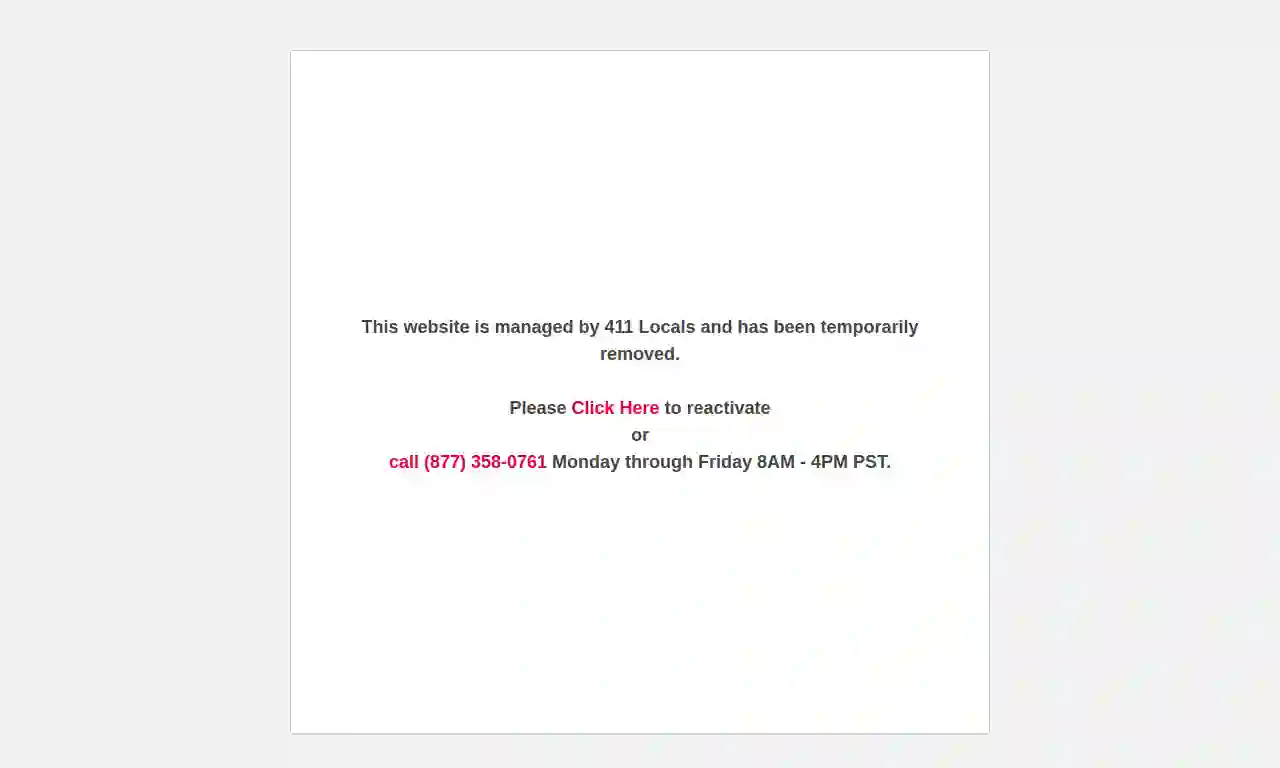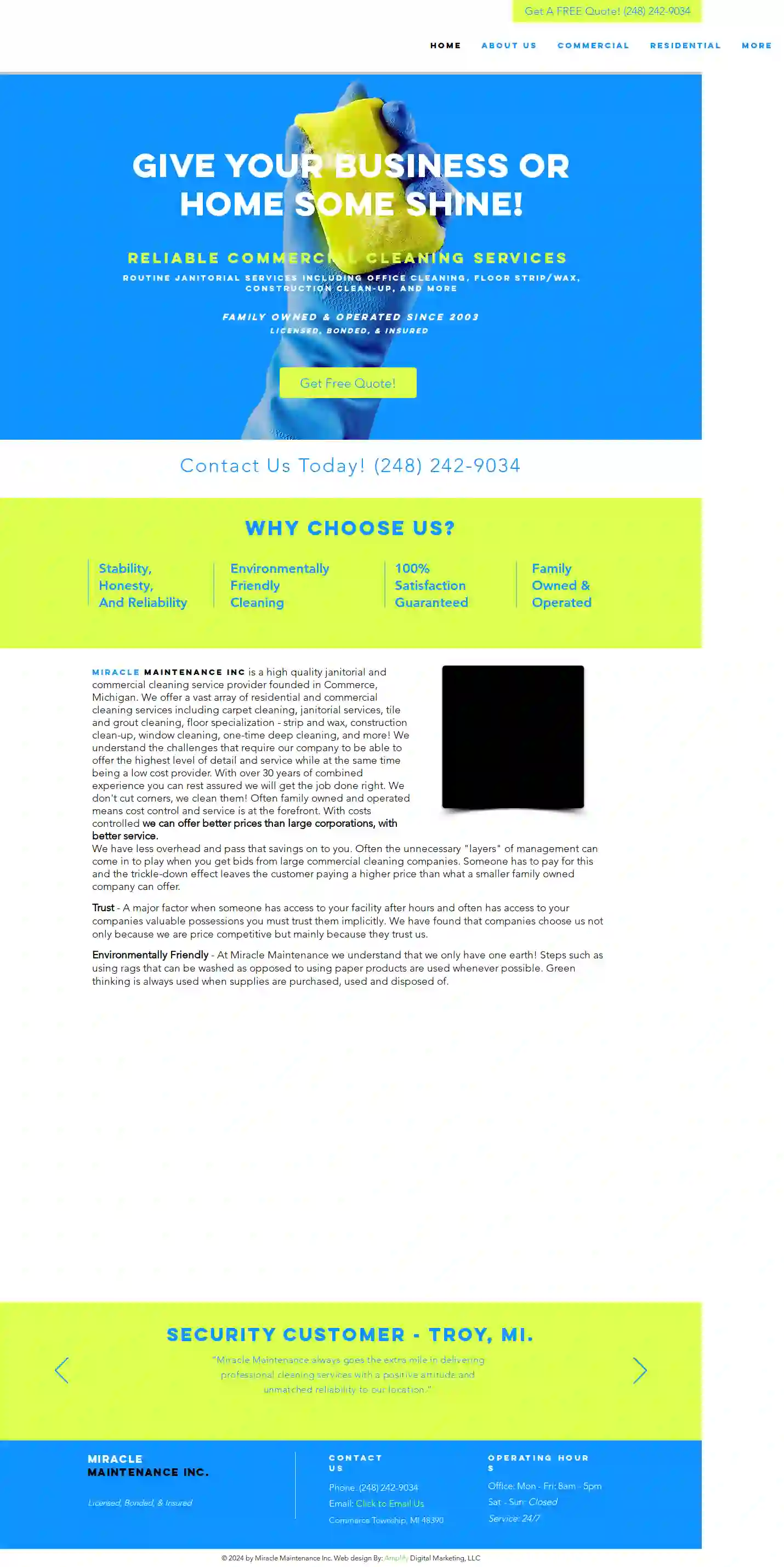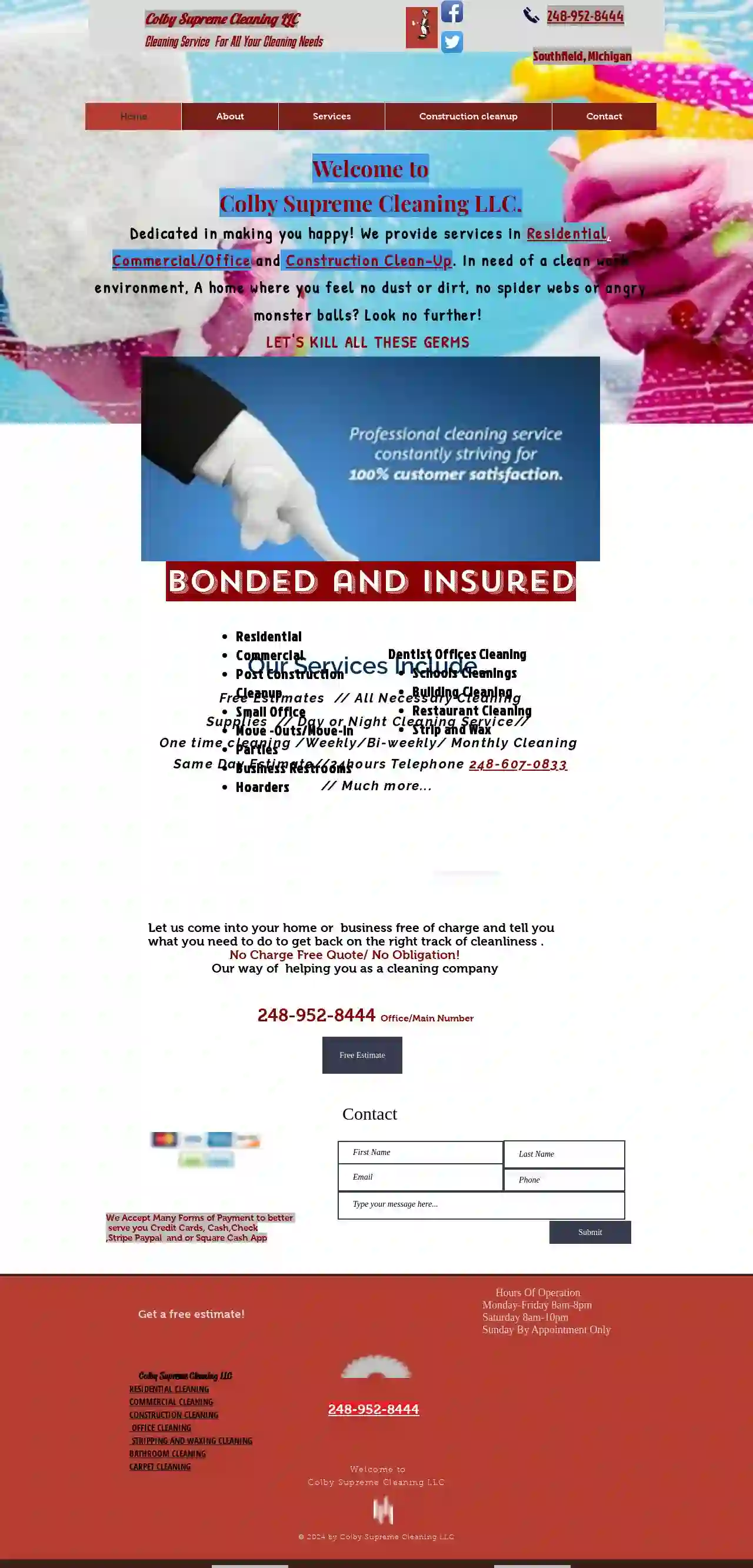Cleaning Services Buchanan
Top 10 Residential Cleaning in Buchanan
Receive up to 3 Cleaning Companies quotes for your project today! Compare profiles, reviews, accreditations, portfolio, etc... and choose the best offer.

Sparkle Commercial Cleaning
32 reviewsDetroit, 48219, USSparkle Commercial Cleaning specializes in providing top-notch commercial cleaning services in Detroit, MI. With over 25 years of experience, we offer a wide range of services including construction cleaning, office cleaning, floor waxing, upholstery cleaning, event cleanup, and Airbnb cleaning. Our team is dedicated to providing exceptional results using eco-friendly products, ensuring not only cleanliness but also sustainability. We are licensed, insured, and committed to customer satisfaction.
- Services
- Why Us?
- Accreditations
- Gallery
Get Quote
Clean By Design
589 reviewsKalamazoo, US- Services
- Why Us?
- Gallery
Get Quote
Molly Maid of Kalamazoo / Portage
4.7165 reviewsKalamazoo, US- Services
- Why Us?
- Gallery
Get Quote
Maids In A Minute Of Ann Arbor
4.58 reviewsAnn Arbor, US- Services
- Why Us?
- Gallery
Get Quote
CleanNet of Greater Michigan, Inc.
3.317 reviewsDetroit, US- Services
- Why Us?
- Gallery
Get Quote
Clean Team Battle Creek
543 reviewsDetroit, US- Services
- Why Us?
- Gallery
Get Quote
Miracle Maintenance, Inc.
513 reviewsDetroit, US- Services
- Why Us?
- Gallery
Get Quote
Colby Supreme Cleaning LLC
48 reviewsDetroit, US- Services
- Why Us?
- Gallery
Get Quote
Jani-King of Detroit | Janitorial & Commercial Cleaning Services
4.759 reviewsDetroit, US- Services
- Why Us?
- Gallery
Get Quote
Merry Maids of Muskegon
4.132 reviewsMuskegon, US- Services
- Why Us?
- Gallery
Get Quote
Over 60,241+ Cleaning Contractors onboarded
Our janitorial pros operate in Buchanan & surrounding areas!
CleaningMatch has curated and vetted the Best Cleaning Services near Buchanan. Find the most reliable pro today.
Frequently Asked Questions About Cleaning Services
- Experience: 'How long have you been in business, and what type of cleaning services do you specialize in?'
- Licensing and Insurance: 'Are you licensed, insured, and bonded? Can I see proof of coverage?'
- Background Checks: 'Do you conduct background checks on your employees?'
- Cleaning Supplies: 'Do you provide your own cleaning supplies and equipment, or should I provide them?'
- Cleaning Methods: 'What cleaning methods and products do you use?'
- References: 'Can you provide references from previous clients?'
- Scheduling and Availability: 'What days and times are you available for cleaning?'
- Pricing and Payment: 'What is your pricing structure, and what payment methods do you accept?'
- Cancellation Policy: 'What is your cancellation policy?'
- Satisfaction Guarantee: 'Do you offer a satisfaction guarantee? What happens if I'm not happy with the service?'
- Prepare the Windows: Remove dust and debris from windows using a brush, vacuum, or damp cloth.
- Cleaning Solution: Use a commercial glass cleaner or a homemade solution of equal parts water and vinegar.
- Spray and Wipe: Spray the cleaning solution onto the window, ensuring even coverage.
- Squeegee Technique: Use a squeegee to wipe the cleaner from top to bottom, overlapping each stroke by about an inch. Wipe the squeegee blade clean after each stroke.
- Dry Edges: Wipe the edges of the window with a clean, dry microfiber cloth to remove any remaining moisture.
- Dishes: Load the dishwasher or wash dishes by hand.
- Sink: Clean the sink with a sponge or cloth and dish soap. Pay attention to the faucet and drain. You can also use a baking soda paste to remove stubborn stains.
- Countertops: Wipe down countertops with a disinfectant cleaner or all-purpose cleaner.
- Stovetop: Clean the stovetop with a degreaser or stovetop cleaner. Remove burner grates and wash them separately if needed.
- Oven: Clean the oven according to the manufacturer's instructions. You can use a self-cleaning function or a commercial oven cleaner.
- Microwave: Clean the microwave interior with a damp cloth or sponge. For stuck-on food, heat a bowl of water with lemon juice in the microwave for a few minutes to loosen debris.
- Refrigerator: Wipe down the refrigerator shelves and drawers with a damp cloth or sponge. Remove any expired food and clean spills promptly.
- Floors: Sweep or vacuum the floor, then mop with a floor cleaner suitable for your kitchen floor type.
- Trash: Empty the trash can and recycling bin.
- Floors: Use floor cleaners designed for your specific floor type, such as hardwood, tile, or laminate. Avoid using harsh cleaners that can strip finishes or cause discoloration.
- Countertops: Clean granite, marble, or quartz countertops with pH-neutral cleaners to prevent etching or damage. Use disinfecting wipes or sprays for other countertops.
- Bathrooms: Use bathroom cleaners designed to remove soap scum, mildew, and hard water stains. Avoid using abrasive cleaners on fixtures or tiles.
- Glass and Mirrors: Clean windows and mirrors with glass cleaners that leave a streak-free finish. Avoid using paper towels, which can leave lint behind.
- Appliances: Clean stainless steel appliances with specialized cleaners that prevent streaks and fingerprints. Use degreasers for ovens and stovetops.
What should I ask a cleaning service before hiring them?
By asking these questions, you can assess their professionalism, reliability, and suitability for your cleaning needs.
What is the best way to clean windows without streaks?
For best results, clean windows on a cloudy day or in the shade to prevent the cleaning solution from drying too quickly and leaving streaks.
What is the most efficient way to clean a kitchen?
Regularly cleaning your kitchen helps maintain a hygienic and organized space for cooking and dining.
How do I choose the right cleaning products for different surfaces?
If you're unsure about the right cleaning product for a surface, consult the manufacturer's instructions or seek advice from a cleaning professional.
What should I ask a cleaning service before hiring them?
- Experience: 'How long have you been in business, and what type of cleaning services do you specialize in?'
- Licensing and Insurance: 'Are you licensed, insured, and bonded? Can I see proof of coverage?'
- Background Checks: 'Do you conduct background checks on your employees?'
- Cleaning Supplies: 'Do you provide your own cleaning supplies and equipment, or should I provide them?'
- Cleaning Methods: 'What cleaning methods and products do you use?'
- References: 'Can you provide references from previous clients?'
- Scheduling and Availability: 'What days and times are you available for cleaning?'
- Pricing and Payment: 'What is your pricing structure, and what payment methods do you accept?'
- Cancellation Policy: 'What is your cancellation policy?'
- Satisfaction Guarantee: 'Do you offer a satisfaction guarantee? What happens if I'm not happy with the service?'
By asking these questions, you can assess their professionalism, reliability, and suitability for your cleaning needs.
What is the best way to clean windows without streaks?
- Prepare the Windows: Remove dust and debris from windows using a brush, vacuum, or damp cloth.
- Cleaning Solution: Use a commercial glass cleaner or a homemade solution of equal parts water and vinegar.
- Spray and Wipe: Spray the cleaning solution onto the window, ensuring even coverage.
- Squeegee Technique: Use a squeegee to wipe the cleaner from top to bottom, overlapping each stroke by about an inch. Wipe the squeegee blade clean after each stroke.
- Dry Edges: Wipe the edges of the window with a clean, dry microfiber cloth to remove any remaining moisture.
For best results, clean windows on a cloudy day or in the shade to prevent the cleaning solution from drying too quickly and leaving streaks.
What is the most efficient way to clean a kitchen?
- Dishes: Load the dishwasher or wash dishes by hand.
- Sink: Clean the sink with a sponge or cloth and dish soap. Pay attention to the faucet and drain. You can also use a baking soda paste to remove stubborn stains.
- Countertops: Wipe down countertops with a disinfectant cleaner or all-purpose cleaner.
- Stovetop: Clean the stovetop with a degreaser or stovetop cleaner. Remove burner grates and wash them separately if needed.
- Oven: Clean the oven according to the manufacturer's instructions. You can use a self-cleaning function or a commercial oven cleaner.
- Microwave: Clean the microwave interior with a damp cloth or sponge. For stuck-on food, heat a bowl of water with lemon juice in the microwave for a few minutes to loosen debris.
- Refrigerator: Wipe down the refrigerator shelves and drawers with a damp cloth or sponge. Remove any expired food and clean spills promptly.
- Floors: Sweep or vacuum the floor, then mop with a floor cleaner suitable for your kitchen floor type.
- Trash: Empty the trash can and recycling bin.
Regularly cleaning your kitchen helps maintain a hygienic and organized space for cooking and dining.
How do I choose the right cleaning products for different surfaces?
- Floors: Use floor cleaners designed for your specific floor type, such as hardwood, tile, or laminate. Avoid using harsh cleaners that can strip finishes or cause discoloration.
- Countertops: Clean granite, marble, or quartz countertops with pH-neutral cleaners to prevent etching or damage. Use disinfecting wipes or sprays for other countertops.
- Bathrooms: Use bathroom cleaners designed to remove soap scum, mildew, and hard water stains. Avoid using abrasive cleaners on fixtures or tiles.
- Glass and Mirrors: Clean windows and mirrors with glass cleaners that leave a streak-free finish. Avoid using paper towels, which can leave lint behind.
- Appliances: Clean stainless steel appliances with specialized cleaners that prevent streaks and fingerprints. Use degreasers for ovens and stovetops.
If you're unsure about the right cleaning product for a surface, consult the manufacturer's instructions or seek advice from a cleaning professional.